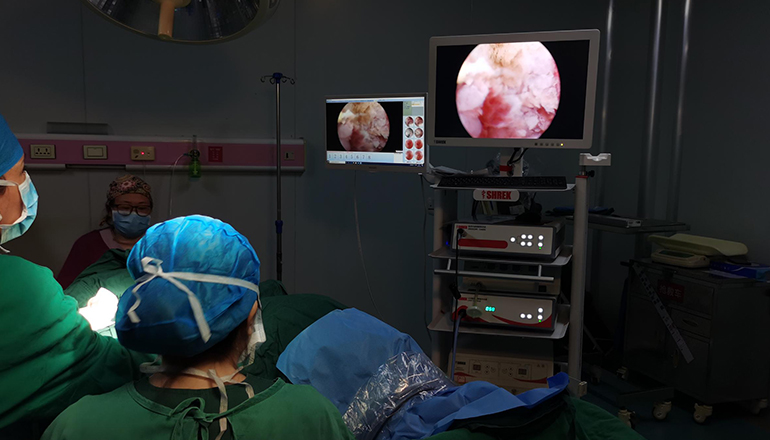- Shanghai, China
- [email protected]
- +86-21-58189111
Hysteroscopy is a medical procedure that involves the use of a hysteroscope, which is a thin, lighted instrument that is inserted into the uterus through the vagina and cervix. The hysteroscope allows the doctor to view the inside of the uterus and perform certain procedures. Hysteroscopy surgery is commonly used to diagnose and treat various conditions of the uterus. Here are some of the applications of hysteroscopy surgery:
Diagnosis of abnormal bleeding: Hysteroscopy is used to diagnose the cause of abnormal uterine bleeding, such as heavy or prolonged menstrual periods, bleeding between periods, or bleeding after menopause. Abnormal bleeding may be caused by polyps, fibroids, or other growths in the uterus, and hysteroscopy can help identify these growths.
Treatment of fibroids and polyps: Hysteroscopy surgery can be used to remove fibroids and polyps from the uterus. Fibroids are non-cancerous growths in the uterus, while polyps are small, benign growths that can cause abnormal bleeding. Hysteroscopy surgery can be performed to remove these growths, which can relieve symptoms and improve fertility.
Treatment of endometrial hyperplasia: Hysteroscopy can be used to diagnose and treat endometrial hyperplasia, a condition in which the lining of the uterus becomes too thick. Endometrial hyperplasia can lead to abnormal bleeding and may increase the risk of uterine cancer. Hysteroscopy surgery can be used to remove the thickened lining of the uterus and reduce the risk of cancer.

Evaluation of infertility: Hysteroscopy can be used to evaluate the uterine cavity in women who are experiencing infertility. The procedure can help identify uterine abnormalities that may be contributing to infertility, such as scar tissue or polyps.
Sterilization: Hysteroscopy surgery can be used to perform sterilization procedures, such as tubal ligation or Essure. These procedures involve blocking the fallopian tubes to prevent pregnancy. Hysteroscopy allows the doctor to visualize the fallopian tubes and ensure that the procedure is performed correctly.
Removal of intrauterine devices (IUDs): Hysteroscopy can be used to remove IUDs that have become embedded in the uterine wall or are causing pain or other symptoms.
Overall, hysteroscopy surgery is a valuable tool in the diagnosis and treatment of various uterine conditions. The procedure is minimally invasive and can be performed on an outpatient basis, with a quick recovery time. It is important to discuss the risks and benefits of hysteroscopy with your doctor before undergoing the procedure.
Treatment of uterine adhesions: Hysteroscopy surgery can be used to treat uterine adhesions, which are scar tissue that forms inside the uterus. Uterine adhesions can cause infertility, miscarriage, and menstrual problems. Hysteroscopy allows the doctor to remove the scar tissue and improve fertility outcomes.
Evaluation of uterine anomalies: Hysteroscopy can be used to evaluate the uterus for congenital anomalies, such as a uterine septum or bicornuate uterus. These anomalies can contribute to infertility, miscarriage, and preterm labor. Hysteroscopy surgery can be used to correct these anomalies and improve pregnancy outcomes.
Management of Asherman's syndrome: Hysteroscopy is the gold standard for the diagnosis and treatment of Asherman's syndrome, which is the formation of adhesions in the uterine cavity after trauma or surgery. Hysteroscopy allows the doctor to visualize and remove the adhesions, improving the chances of successful pregnancy.
Management of uterine cancer: Hysteroscopy can be used to diagnose and stage uterine cancer. The procedure allows the doctor to take a biopsy of the uterine lining and determine the extent of the cancer. Hysteroscopy surgery can also be used to remove early-stage uterine cancer.
In conclusion, hysteroscopy surgery is a versatile tool in the diagnosis and treatment of various uterine conditions. The procedure allows for accurate diagnosis and targeted treatment of uterine abnormalities, with minimal risk and quick recovery time. If you are experiencing symptoms related to your menstrual cycle or fertility, talk to your doctor about whether hysteroscopy may be appropriate for you.
Leave a Comments